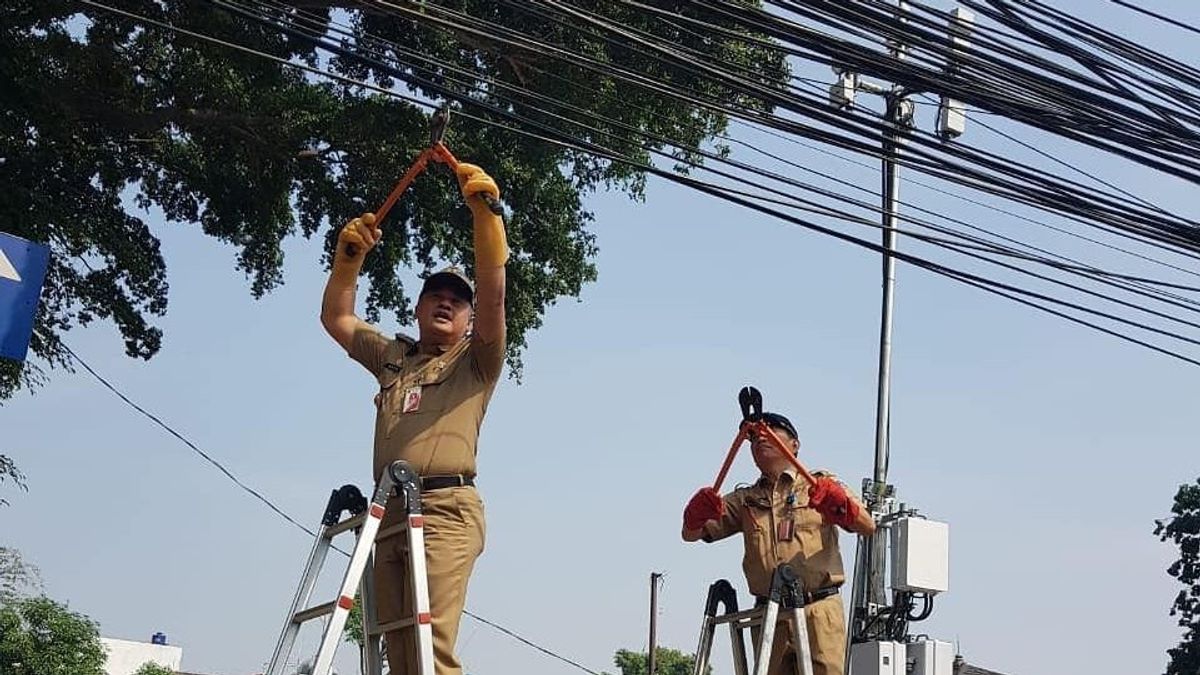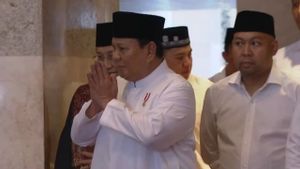JAKARTA - The Association of Telecommunication Network Providers (Apjatel) has faced a new problem after the unilateral cutting of fiber cables by the DKI Provincial Government. Now, they are worried about the high rents for underground Utilities networks.
This program is one of the regional strategic activities of DKI Jakarta Governor Anies Baswedan. Anies ordered PD Sarana Jaya and PT Jakarta Propertindo (JakPro) to work on laying underground cables so that there are no longer optical cables above the ground.
Rental prices for new optical cables and manufacturing of integrated ducting. PD Sarana Jaya has set a revitalized lease for ducting on sidewalks of Rp 700 thousand per meter per operator per one road segment.
Meanwhile, the lease for the manufacture of integrated ducting on sidewalks that has not been revitalized is pegged at IDR 600 thousand per meter per operator per one road segment.
High prices are also felt in cable rental. PT Jakpro is offering Rp. 70 thousand per meter per year per one road segment in Jakarta.
Executive Director of the ICT Institute Heru Sutadi considered, before making ducting and charging fees, the DKI Provincial Government should involve business actors providing public services and telecommunications operators. This is in order to find a number agreement point that does not hurt the provider and is not too cheap.
"If the price is too high it will burden the company and in the end the costs will be borne by the public. But if it is too cheap the provincial government also does not have the ability to maintain and develop ducts elsewhere and in the future," Heru told reporters, Tuesday, December 3 .
Separately, the Director General of Resources and Equipment of Post and Information Technology (Dirjen SDPPI) of the Ministry of Communication and Information Technology (Kemkominfo) Ismail hopes that Anies will not set large rental fees for public service providers.
According to Ismail, Anies' mindset regarding telecommunications infrastructure is wrong because it turns telecommunications infrastructure into a regional revenue source (PAD), by imposing burdensome levies on companies.
In fact, the telecommunications sector and service providers to the public should not be burdened with this. This is because the income provided by other sectors with the presence of Telecommunication infrastructure will be greater than retribution.
"There will be many economies that will take advantage of the existing broadband network and infrastructure in Jakarta. President Jokowi's five priority programs all require broadband," said Ismail.
"Later I will report to the Minister of Communication and Information regarding the lease issue. Hopefully the Omnibus Law can be the best solution for local governments and public infrastructure providers," he continued.
Separately, Head of DKI Jakarta Bina Marga Agency Hari Nugroho stated that the lease rates for the implementation of ducting can be one of the boosters for the realization of local revenue (PAD) in the retribution sector. According to him, so far there has been no lease levy, so utility actors carelessly place it in the air.
Meanwhile, the proposed rental rates range from IDR 13,000 or IDR 17,000 to IDR 70,000 per meter per year per one road segment. However, Hari explained that this matter could still be considered in the discussion later.
"That also needs to be justified first. So if the discussion is only Rp. 15,000, we will decide that much. But it hasn't been decided yet, there are still many considerations," Hari said when confirmed.
The case began when Apjatel issued a summons to DKI Jakarta Governor Anies Baswedan and the DKI Jakarta Bina Marga Office for unilaterally cutting fiber optic cables on Jalan Cikini Raya.
Initially, Anies issued Governor's Instruction Number 126 of 2018 concerning Arrangement and Control of Utility Networks on 81 roads in DKI Jakarta. The instructions came out in December 2018.
In accordance with DKI Jakarta Regional Regulation No. 8 of 1999, cellular network operators are given time to lower the fiber optic cable previously stretched on the pole to enter the ground, no later than one year from the issuance of the Ingub. This means that Apjatel still has time until December 2019 to carry out cable arrangement.
Head of the Highways Service, Hari Nugroho, answered that the reason for the provincial government to cut cables unilaterally was because Apjatel did not have a permit to install cables in the air.
In carrying out this unilateral action, the DKI Jakarta Provincial Government adheres to the DKI Jakarta Regional Regulation Number 8 of 1999 concerning Utility Networks.
Article 5 states that the placement of utility networks can be carried out underground, above land, and in the sea. So, the placement above the ground can be allowed on overpasses, flyovers, upper and lower crossings.
The case was brought to the Indonesian Ombudsman Representative of DKI Jakarta. both Apjatel and DKI Pemprov are guilty. Apjatel did not implement Pergub 195 of 2010 concerning Guidelines for Implementing the Establishment of Utility Networks for five years. Because of this, the hanging optical cable that runs from Jalan Cikini Raya to Kemang is not licensed.
Meanwhile, the DKI Provincial Government who cut Utilities cables unilaterally was also guilty of not providing ducting and mainhall to store optical cables underground.
Therefore, the Ombudsman asked the two parties to make a joint work plan related to moving air utilities until December 2019, and a work plan in 2020.
The English, Chinese, Japanese, Arabic, and French versions are automatically generated by the AI. So there may still be inaccuracies in translating, please always see Indonesian as our main language. (system supported by DigitalSiber.id)













